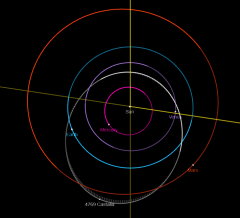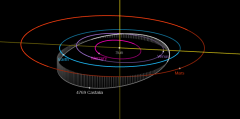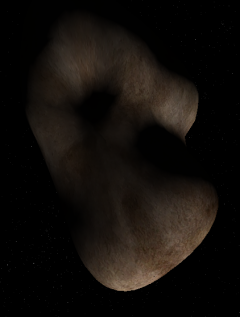Difference between revisions of "4769 Castalia"
(Corrected link.) |
(Added image size.) |
||
| Line 67: | Line 67: | ||
==Gallery== | ==Gallery== | ||
| − | [[File:4769 Castalia Orbit 01.png]] | + | [[File:4769 Castalia Orbit 01.png|240 px]] |
| − | [[File:4769 Castalia Orbit 02.png]] | + | [[File:4769 Castalia Orbit 02.png|240 px]] |
<br>Views of the orbits of the inner planets showing the orbit of 4769 Castalia. | <br>Views of the orbits of the inner planets showing the orbit of 4769 Castalia. | ||
<br>Source - [https://ssd.jpl.nasa.gov/tools/orbit_viewer.html JPL Horizons Orbit Viewer] | <br>Source - [https://ssd.jpl.nasa.gov/tools/orbit_viewer.html JPL Horizons Orbit Viewer] | ||
Revision as of 13:05, 18 May 2024
|
Project home: AsteroidPack 1.00.zip |
4769 Castalia is a near-Earth object of the Apollo group of asteroids. It was discovered by Eleanor Helin at Palomar Observatory on 9 August 1969, and on 28 August 1989, Castalia was observed by radar at Arecibo Observatory, the first asteroid modeled by radar. Castalia was made available in Orbiter by Nighthawke's AsteroidPack v1.00 zip file.
Physical Characteristics in Orbiter
In Orbiter Castalia appears to be a contact binary, has a mean diameter of about 1800 meters and a mass of 5×1011 kg. Surface Gravity is about 0.00001 m/s2, and escape velocity is about 0.2 m/s. Landing on Castalia near the waist the spacecraft will land on the radius above the texture surface, but, near the ends, it will land below the texture surface.
Orbital characteristics in Orbiter
The orbit of Castalia varies from inside the orbit of Venus to just outside that of Mars, Semimajor axis is about 159 million Km at an eccentricity 0.483, inclination is of Orbital period is about 400 days.
Gallery


Views of the orbits of the inner planets showing the orbit of 4769 Castalia.
Source - JPL Horizons Orbit Viewer
